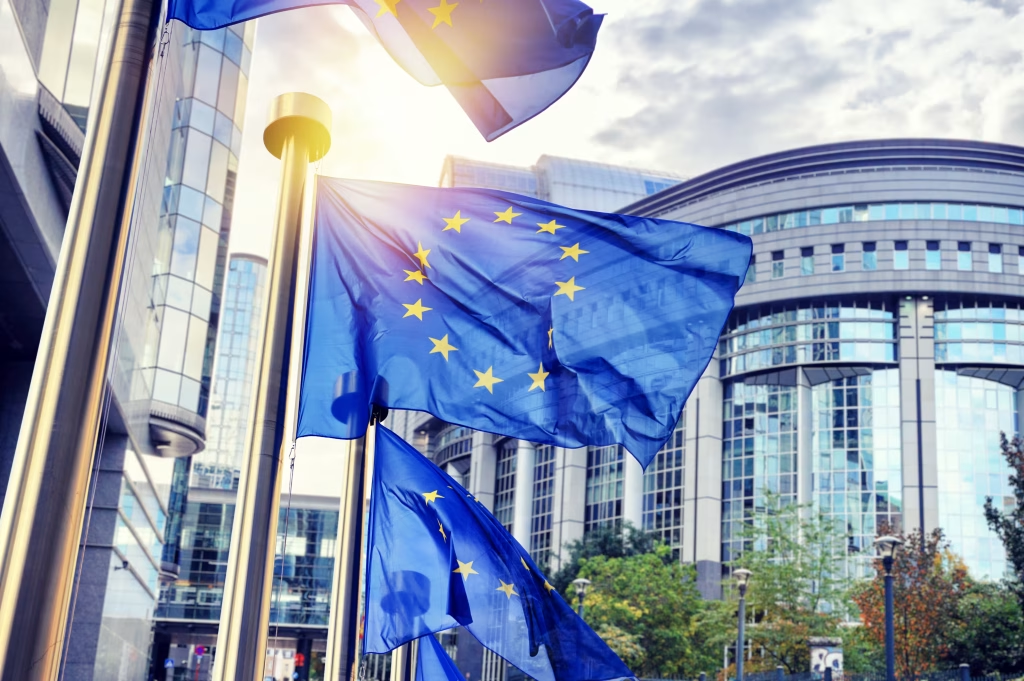
On Thurs 18 July, Ursula von der Layen, the recently re-appointed EU Commission president, received the necessary vote of confidence from the EU parliament that will allow her new Commission to be formed and begin operating. The new Commissioners will also have to be confirmed by the EU parliament; there have been cases in the past in which some appointed Commissioners were voted down. The final score in parliament, where MEPs voted with a secret ballot, recorded 401 votes in favour, 284 against and 22 blank or invalid votes.
Who voted for her? Officially, the European People’s Party (EPP), the Socialists and Democrats (S&D), the Liberals and the Greens. According to the official group sizes (see picture above), she could have counted on 454 votes, which means that – as usually occurs – dissenters likely emerged in all groups. In any event, she had a large safety margin compared to the 360 MEP majority needed to win the vote. On the other hand, the European Conservative and Reformist (ECR) group, led by Italian Prime Minister Giorgia Meloni, voted against, even if the vote was only declared after the result was announced. While it is obvious that von der Leyen got what she wanted, we believe that both “Ursula” and “Giorgia” have made a mistake in their respective strategies. Let’s see why.
In the run up to the vote, “Ursula” had been trying to enlarge her majority beyond the traditional tri-party bloc of Socialist, Christian Democrats and Liberals. She has approached the Greens (to the left) and the ECR (to the right). Eventually, she understood that only the Greens could be trusted to provide a positive vote, which they did mostly to block the mounting right-wing parties, and so she opted for them. In her speech, she promised the “Green Deal” (“clean industrial deal”) to be approved within the first 100 days. While securing a larger and probably more cohesive coalition, she has moved the political axis of the future Commission to the left.
This could prove to be a fatal mistake. In the last few elections for the EU parliament (2014, 2019 and 2024), right-wing parties have increased their relevance in terms of votes and seats. The three right-wing groups (ECR, the Patriots recently formed by Hungarian PM Victor Orban and led by France’s Jordan Bardella, and the new Europe of Sovereign Nations – ESN, where the German AfD resides) now control 25% of the seats in the EU Parliament.
While the continent was moving to the right, the Commission has shifted to the left in an attempt to isolate the rising anti-European, pro-Russian parties. But this has fed the sense of frustration of large swathes of the European electorate, those tired of the Euro-bureaucracy of Brussels and its policies that are perceived to be as elitist, such as the “green deal.” Further ignoring these demands, and doubling down on these policies, will further feed anti-European sentiment. Five years from now, the right-wing parties that are now in opposition may take the lead in the European parliament, especially if Marine Le Pen becomes French President in the meantime.
But “Giorgia” also made a mistake. Reasoning as leader of the ECR, she said she was “coherent” with her declared intention of never mixing her votes with those of the Socialists and the Greens. But by doing so she has completely nullified the results of the European elections in Italy, where she had a resounding success. In fact, she was not consulted for the top jobs of the EU institutions, and now – being in opposition – Italy will have to give up one of the positions of the Executive Vice President, and most likely also a heavy Commissioner role for Raffaele Fitto (or other politicians from her coalition).
Meloni said that the “weight” of the Commissioner will depend only on the relative weight of Italy within the EU, as its third largest economy and second largest manufacturing country behind Germany. But things don’t work like this in politics: Why should von der Leyen give an important portfolio to the Commissioner of a country whose PM has voted against her Commission, when she already enjoys a massive margin above the needed majority? Meloni should have seized the opportunity to enter the big games of EU politics and continue her march towards the centre, and to a possible convergence with the EPP at some point. The moves she made instead will leave Italy isolated and under-represented.
Unfortunately, both mistakes will be paid for by future generations.